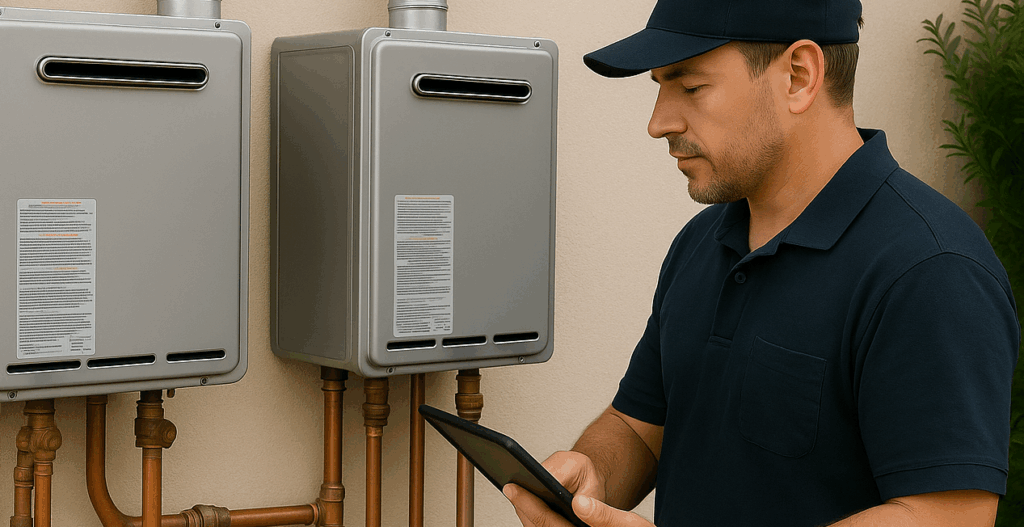Heating water accounts for a significant portion of energy usage in most homes – sometimes up to 20% of your total utility bill. Whether you have a traditional tank water heater, a tankless model, or a hybrid unit, the way you use and maintain your water heater directly impacts both your energy costs and your comfort. The good news? You don’t have to sacrifice hot showers to save money. With some simple habits and a few smart upgrades, you can slash your water heating costs while staying comfortable year-round. Here are the best energy-saving water heater tips for your home.
Lower the Thermostat
Most water heaters come preset at 140°F (60°C), but for most households, 120°F (49°C) is more than sufficient for bathing, laundry, and dishwashing. Lowering the thermostat by 20 degrees can reduce your water heating costs by 6-10% and slows mineral buildup and corrosion in your tank. It also lowers the risk of scalding, making your home safer especially if you have young children or elderly family members.
Tip: Find your water heater’s thermostat (sometimes hidden behind a panel). Adjust it to 120°F and see if your hot water needs are still met – chances are, you won’t notice a difference, except on your bill.
Use Less Hot Water
Reducing your hot water use is one of the easiest and most effective ways to save energy. Small changes in your daily habits can add up to big savings over time:
- Take shorter showers- Even cutting back by two minutes saves gallons per week.
- Install low-flow fixtures- Low-flow showerheads and faucet aerators use less hot water without sacrificing water pressure.
- Wash clothes in cold water- Modern detergents work well in cold water, and you’ll save on heating costs with every load.
- Fix leaks promptly- A single dripping hot water faucet can waste hundreds of gallons each year.
Insulate Your Water Heater Tank
If you have an older tank-style water heater (especially one in a garage or basement), it’s likely losing heat to the surrounding air. Wrapping the tank in an insulating blanket (available at any hardware store) can reduce standby heat loss by up to 45% and cut your water heating costs by 7-16%. Always follow the manufacturer’s instructions and don’t cover thermostats or burner compartments.
Tip: If your tank feels warm to the touch, it’s losing heat and will benefit from insulation.
Insulate Hot Water Pipes
Just like insulating the tank, insulating the first 3-6 feet of hot water pipes reduces heat loss as water travels to your faucet or shower. Pipe insulation is inexpensive and easy to install – just snap foam sleeves over exposed pipes. You’ll get hot water faster at the tap and prevent pipes from sweating or freezing in winter.
Drain the Tank to Remove Sediment
Sediment from minerals in your water supply settles at the bottom of traditional tanks, insulating the water from the heating element and making your unit less efficient. Flushing a few gallons from the tank every 6-12 months helps keep your heater running efficiently and extends its lifespan.
How-to:
- Turn off the heater (and gas if applicable).
- Attach a garden hose to the drain valve.
- Drain a few gallons of water into a bucket until it runs clear.
- Close the valve and remove the hose.
If you hear popping or rumbling sounds from your tank, it’s definitely time for a flush.
Install a Timer (for Electric Water Heaters)
If your schedule is predictable and you don’t need hot water 24/7, an electric water heater timer can help save energy by turning the unit off at night or when you’re at work. Some smart timers even let you program different settings for weekends and weekdays or control them remotely via smartphone.
Use Vacation Mode When Away
Most new water heaters have a “vacation” or “low” setting. If you’re leaving town for several days, set your heater to this mode (or turn it off for electric models) to avoid unnecessary heating. For gas models, turn the thermostat to “pilot” or the lowest setting to save energy while preventing freezing.
Upgrade to a High-Efficiency Water Heater
If your current water heater is more than 10 years old, it’s worth considering a replacement. Modern tankless (on-demand), heat pump, or high-efficiency storage water heaters use 10-50% less energy than older conventional models. While the upfront investment is higher, rebates and energy savings quickly pay off.
Types of Efficient Water Heaters:
- Tankless – Heats water only when needed, eliminating standby losses.
- Heat Pump – Uses electricity to move heat from the air or ground into water, extremely efficient in warm climates.
- Condensing (Gas) – Captures heat from exhaust gases for greater efficiency.
Perform Regular Maintenance
An efficiently running water heater saves energy and lasts longer. Here’s what you should do annually:
- Check and replace the anode rod if corroded (for tank models).
- Test the pressure relief valve.
- Inspect for leaks and corrosion.
Clean dust and debris from around the unit.
Schedule a professional inspection every few years to catch any issues before they turn into costly repairs or breakdowns.
Install Water-Saving Appliances
Dishwashers and washing machines with ENERGY STAR ratings use less water and heat it more efficiently. Upgrading old appliances can significantly reduce both water and energy consumption.
Mind Your Dishwasher Settings
Many modern dishwashers have a “heat dry” or “sanitize” mode, which uses extra electricity. Use the “eco” setting or air dry dishes instead. Also, only run full loads to maximize efficiency.
Consider a Solar Water Heater
If you live in a sunny climate, solar water heaters can be a fantastic long-term investment. These systems use free energy from the sun and can be paired with a backup electric or gas heater for cloudy days. While the upfront costs are higher, government incentives and decades of low operating costs make solar an attractive option for many homeowners.
Saving energy with your water heater is easier than you think. Lowering the thermostat, using less hot water, insulating your tank and pipes, and maintaining your unit regularly can lead to noticeable savings and a longer lifespan for your system. For even greater efficiency, consider upgrading to a modern, high-efficiency model or exploring renewable options like solar water heating. Not only will you enjoy lower utility bills, but you’ll also reduce your environmental footprint – one shower at a time. By adopting these simple tips, you can enjoy reliable hot water while keeping your home efficient and eco-friendly for years to come.

